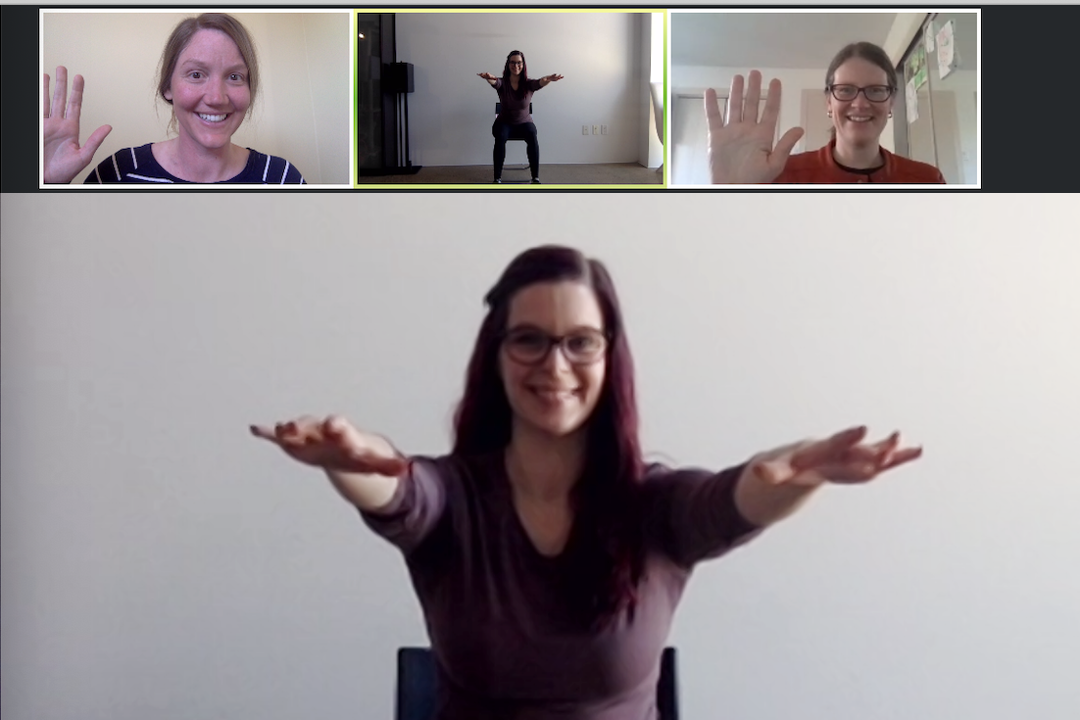
USask researchers offer online support program for people with MS, Parkinson’s and spinal cord injury
During the COVID-19 pandemic, University of Saskatchewan (USask) researchers in physiotherapy, rehabilitation science, and neurology are combining their expertise to provide a free online, virtual program to people with neurological conditions.
By USASK RESEARCH PROFILE AND IMPACTThe program NeuroSask: Active and Connected will begin on April 23. It involves a twice-weekly videoconference consisting of a physiotherapist-guided movement class, followed by an interactive session with guest medical or wellness experts and local artists, or a social activity.
Project co-leads USask physiotherapist Dr. Sarah Donkers (PhD) and physical medicine and rehabilitation expert Dr. Katherine Knox (MD) recognized the gap in physical activity options during the COVID-19 pandemic, especially for people with existing mobility restrictions.
“The ultimate goal is to provide people who have Multiple Sclerosis (MS), Parkinson’s disease, and spinal cord injuries with access to support and health experts while their in-person exercise and support programs are closed,” said Donkers.
The first 30 minutes of each workshop will feature movements targeting people with mobility impairments, which will be done while seated, and evidence-based information on the importance of maintaining physical activity for people with neurological conditions.
The latter 30 minutes will alternate between opportunities to connect virtually with health and wellness experts such as leading physicians in MS, Parkinson’s and spinal cord injury, and activities which enable a social connection through music and karaoke quiz games. The content of future sessions will be based on the interests of attendees.
“This is a venue to hear people’s needs, and there’s also a support and community connection aspect, helping people to find and help each other,” said Donkers.
The team includes top medical experts in the province: USask neurologists Dr. Michael Levin (MD) who holds the Saskatchewan MS Clinical Research Chair; Dr. Alex Rajput (MD), Director of the Movement Disorders Program; Dr. Ilia Poliakov (MD), Director of the Multiple Sclerosis Clinic; pharmacy researcher Dr. Charity Evans (PhD); and Dr. Gary Linassi (MB), head of the Saskatchewan provincial physical medicine and rehabilitation department.
The program will also aim to offer practical advice on health in the context of the pandemic, for example, how to disinfect a wheelchair.
“There is an overwhelming amount of information out there right now, and it may be taxing on your mental health to try and track down all the relevant information yourself,” Donkers said.
While the program is called NeuroSask, the name reflects where the program is physically located and is not limited to people living in Saskatchewan.
“Anyone can join. We do want to be inclusive,” said Donkers.
The program has been awarded $9,400 by the Saskatchewan Health Research Foundation’s (SHRF) Research Connections COVID-19 Rapid Response program, and matching cash and in-kind support of $11,500 from the Multiple Sclerosis Society of Canada, Parkinson Canada, Spinal Cord Injury Saskatchewan Inc., the College of Medicine’s Departments of Neurology and Physical Medicine and Rehabilitation, the Saskatoon MS Clinic, and the Office of the Saskatchewan MS Clinical Research Chair.
The nine-week program will begin Thursday, April 23, and run on Tuesdays and Thursdays from 2 pm until 3 pm. Visit https://rehabscience.usask.ca/neurosask.php to register.
